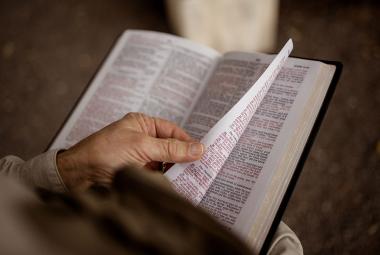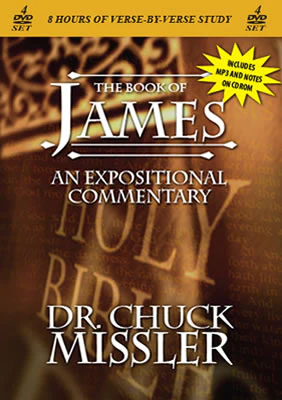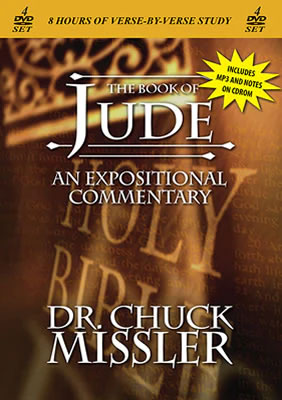The books of James and Jude are part of a section of the Bible known as the Hebrew Epistles (the other books are Hebrews, I & II Peter, and I, II, & III John). They were, in large measure, written to the Jews, and yet they have important lessons for us all.
The Book of James
From Matthew 13, Mark 6, and Galatians 1 we know that James was a half brother of Jesus. He was an unbeliever until after the resurrection, when Christ appeared to him. He was married and was the leader of the church in Jerusalem, which, incidentally, has been confirmed by some recent excavations.
When Peter was released from prison (Acts 12), he instructed the disciples to go tell James. James issued the verdict of the Jerusalem Council and did the Proclamation of Gentile Christianity (both in Acts 15).
When Paul arrived in Jerusalem, he reported to James (Acts 21). In Galatians 2 we find that his name was used without permission by the Judaizers. (James was executed in A.D. 62, which confirms the early dating of the New Testament as there is no mention of his death.)
The Epistle of James is a little different from the letters of Paul. James dealt with conduct, not creed; behavior, not belief; deed, not doctrine. He spoke of endurance of faith and outward trials of inward temptations in the first chapter. And he gave ways to test the genuineness of faith - our response to the Word of God.
These include our response to social situations, the production of good works, the exercise of self-control, our reaction to worldliness, and our resort to prayer in all circumstances. These are not ways to get saved, but are demonstrations of faith that show we are saved.
Faith without works is a major theme in James:
Yea, a man may say, Thou hast faith, and I have works: show me thy faith without thy works, and I will show thee my faith by my works.
James 2:18
He was not writing about being justified before God by your works, but being justified before men. If you say you have faith and don't have a changed life, there is still something lacking. He was not in conflict with Paul; he was just tackling a different issue. Paul wrote about justification before the throne of God, James dealt with justification in society.
James was intensely Jewish, as evidenced by his advice to Paul when he came to Jerusalem bringing alms for his nation, and when he suggested that Paul should be at charges for some brethren who were about to complete their Nazariteship (Acts 21:18ff).
The epistle evidences a closer connection with the Sermon on the Mount than any other New Testament letter. It contains 54 imperative verbs are in 108 verses: It is a call to action all the way through.
The Book of Jude
The Epistle of Jude is just one chapter, but its full of surprises! Like James, Jude is also a half brother of Jesus, as listed in Matthew 13:55 and Mark 6:3. He also was an unbeliever while Christ was alive, but became a believer after the resurrection, according to John 7:3-5 and Acts 1:14.
In his letter, Jude attacked apostasy and argued for his readers to contend for the faith because some people would fall away. He argued against their subtle perversions, which included at least two basic denials: denying grace by turning it to lasciviousness (just because we have liberty in Christ does not give us a right to sin); and, denying our Lord and Master Jesus Christ.
Apostasy will lead to certain doom, and he used three examples: Egypt, the angels in Genesis 6, and Sodom. He also pointed to the examples of Cain, Balaam, and Korah; and then emphasized the utter falsity of these false teachers by using six awful metaphors.
Peters second epistle deals with these same issues, but in Peter they are future tense; in Jude, they are past tense. Apparently, the prophesies in 2 Peter were fulfilled by the time Jude wrote his letter.
In light of the fact that apostasy has been foretold, Jude told his readers how to contend: they should build, pray, keep and look. And they should support those who contend. He focused on the certainty of judgment, and he used an extremely provocative example:
And the angels which kept not their first estate, but left their own habitation, he hath reserved in everlasting chains under darkness unto the judgment of the great day. Even as Sodom and Gomorrah, and the cities about them in like manner, giving themselves over to fornication, and going after strange flesh, are set forth for an example, suffering the vengeance of eternal fire.
Jude 1:6-7
Jude argued that these false teachers were going to be judged. Then he linked the errors of Sodom and Gomorrah in ''going after strange flesh'' with the angels in Genesis 6. (The Bible always confirms the truth by two or three witnesses, and 2 Peter 2:4 and Jude 1:6,7 refer to the angels in Genesis 6.)
Jude also writes something extremely provocative - he quotes a prophecy given by Enoch.
And Enoch also, the seventh from Adam, prophesied of these, saying, Behold, the Lord cometh with ten thousands of his saints, To execute judgment upon all, and to convince all that are ungodly among them of all their ungodly deeds which they have ungodly committed, and of all their hard speeches which ungodly sinners have spoken against him.
Jude 1:14-15
Jude was quoting this prophecy of Enoch, as it was presumably familiar to his readers, but lets stop and realize what's going on. The oldest prophecy uttered by a prophet, uttered before the flood of Noah, is a prophecy of the Second Coming of Christ!
But Jude did something else that should disturb us. He made the case that we should not speak evil of dignities, even if they are against us. He chose a bizarre example to make his case:
Likewise also these filthy dreamers defile the flesh, despise dominion, and speak evil of dignities. Yet Michael the archangel, when contending with the devil he disputed about the body of Moses, durst not bring against him a railing accusation, but said, The Lord rebuke thee.
Jude 1:8-9
Here again, Jude alluded to some background familiar to his readers, but which has been lost to us. First of all, the fact that there was a dispute between Michael and the devil regarding the body of Moses is a surprise. Where did that happen? And why would Satan want the body of Moses?
In any case, the point is that even when Michael is contending with Satan, he doesn't speak evil of Satan. He said, ''The Lord rebuke you.'' Jude would tell us not to speak evil of dignities, and he chose Satan himself to make the point. Don't speak evil of him; don't rail directly against him. Let the Lord deal with him. If you are ever confronted with a demon, rely on the authority of Jesus Christ. Don't try to confront a demon on your own.
This is just a superficial glimpse at these two epistles. If you want an extensive verse-by-verse study of these rich books, check out our commentaries: both James and Jude are available this month. Both studies are eight hours long, perfect for a short fall Bible study.
All of our commentaries include study notes in pdf format to enhance your study.








